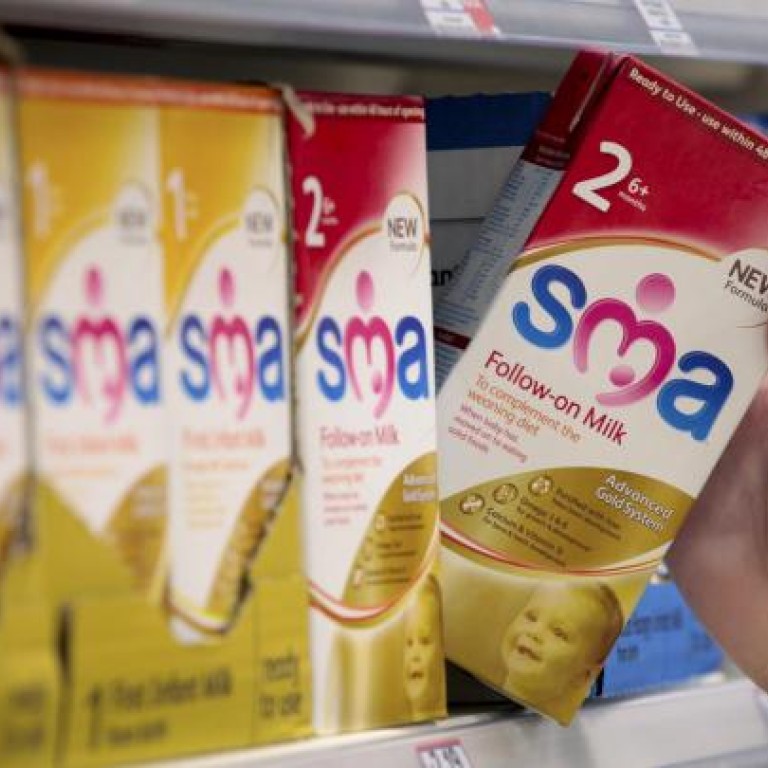
Mainland importers jump on milk train
Prices of foreign-made baby formula in China are highest in the world because mothers will pay for what they believe is a better product
Chinese companies are flocking to bring overseas-brand baby formula into the mainland, where prices and profit margins are among the highest in the world.
Each month yet another batch of imported baby food is added to supermarket shelves around the nation, all packaged for mainland mothers with labels saying they are "tailor-made for Chinese babies".
To overcome their lower brand awareness in a market dominated by big players like Nestle, Abbott, or Wyeth, a host of smaller baby formula brands are battling to establish a foothold in second- and third-tier cities and expand their sales network quickly by offering distributors and retailers commissions of up to 50 per cent on their sales.
At the China International Dairy Products Fair in Beijing last month, about 65 of the more than 100 booths were taken up by baby formula sellers who were looking for franchisees or distributors.
Many of them had turned to the lucrative baby food sector from other businesses, including importing adult food and drugs, frozen food, and even textiles.
Li Mingli, a sales director of Shenzhen Jinyongfeng Industry & Trade, said his company was working with a dairy farm in New Zealand and would launch a new baby formula brand called Infans Gold in China next month.
A 500 gram container of formula for newborns will cost 398 yuan (HK$489), and 378 yuan for babies from six months to one-year-old, he said.
"The profit for selling imported baby formula is much higher than for the sale of domestic baby food," said Li, who used sell domestic milk powder brands like Wandashan.
The high profit margin is driven by the super-high prices that local mothers are prepared to pay.
Stefan Hipp, chairman of Germany's largest baby formula maker HiPP, said during a visit to China last month that the price of imported baby formula in the country was the highest in the world.
In Europe, most baby formula is sold for about €10 to €20 (HK$100 to HK$200) per tin, but in China prices would be twice or even three times as high. A standard container of baby formula from Abbott, Wyeth, or Mead Johnson, sells for the equivalent of 150 to 160 yuan in Singapore, Thailand, or Malaysia. But the same products sell for 250 yuan or more in China, mainland media have reported.
Industry analysts say the world's dominant baby food manufacturers intend to use a high pricing strategy to maintain their high-end image in China.
This strategy is not costing them customers because consumers are willing to pay a premium for the imported product following a string of quality scandals that have the domestic producers over the years.
In 2008, melamine, a toxic chemical, was found in baby formula made by a number of major national brands. At least six babies died and thousands fell ill after drinking the formula.
The effect of the scandal continues to reverberate. Wealthy parents in big cities and more and more middle-class mothers in smaller cities have turned to foreign-branded formula for their only child, regardless of how much it costs.
Li Mingli said market research showed the potential for sales in second- and third-tier cities was strong. His company plans to sell its imported formula in 100 cities in inland provinces like Hubei and Henan next year.
The high prices paid for imported baby formula ensured there was ample room to promote the products, he said.
"Supermarkets will take around 15 per cent of our sales revenue. But for domestic brands, they will take as much as 30 per cent. The gap is because they think imported food products offer better quality and sell faster," he said.
After paying import tax and other costs, his company would earn a net profit of 8 per cent. "But this will grow much higher in the second and third year."
Another Shandong-based company, Li Jian Biological Technology, has been selling a New Zealand formula, branded Yum Yum, in Shandong, Sichuan, and Zhejiang provinces for nearly a year.
The company's deputy general manager, Wang Anshe, said there were at least 50 different brands of New Zealand baby formula in China.
"But more than half of them are fake," Wang claimed.
"Many are just imports of cheap milk powder from overseas that is repacked in China," he said
